
In our technologically advanced society, we are able to detect a multitude of threats before they become a problem. By monitoring the Earth's temperature, for example, we are more than aware of the impact which pollution is having on the planet, and that's why so many measures are being taken to reduce it. Similarly, we are also able to detect extraterrestrial threats.
The most common example of these are meteors, which, as the extinction of the dinosaurs proved, have the potential to wipe out life as we know it. While the majority of rocks that come whizzing into our atmosphere are harmless, there are some which have the potential to cause some serious damage, even if they don't wipe us out as swiftly as they did the dinosaurs.

So, naturally, people were outraged when news emerged that a meteor hit the Earth with 2.1 kilotons of force on July 25, but the incident wasn't reported by the airforce - despite the fact that it could have caused multiple fatalities if it had hit at a slightly different angle. But even more worryingly, the impact zone was just 27 miles north of Thule Air Base in Greenland.
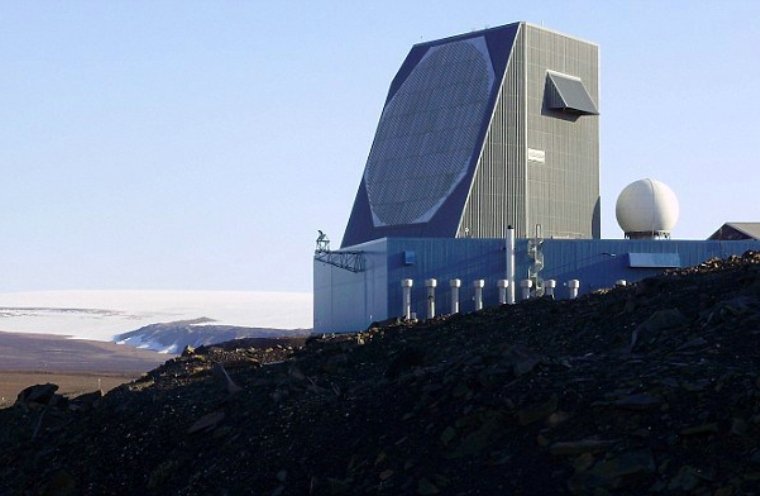
Because the US airbase exists to detect threats, the meteor could have been misinterpreted as an enemy missile and resulted in a nuclear launch. After all, it was sheer chance which led to it landing so close to such an important military base.
This massive failure to disclose information was exposed on Twitter by the director of the Nuclear Information Project for the Federation of American Scientists, Hans Kristensen, who was angry that the government did not issue a warning.
"Meteor explodes with 2.1 kilotons force 43 km above missile early warning radar at Thule Air Base," wrote Hans Kristensen before ominously alluding to how dangerous this incident had the potential to be, "We're still here, so they correctly concluded it was not a Russian first strike. There are nearly 2,000 nukes on alert, ready to launch."
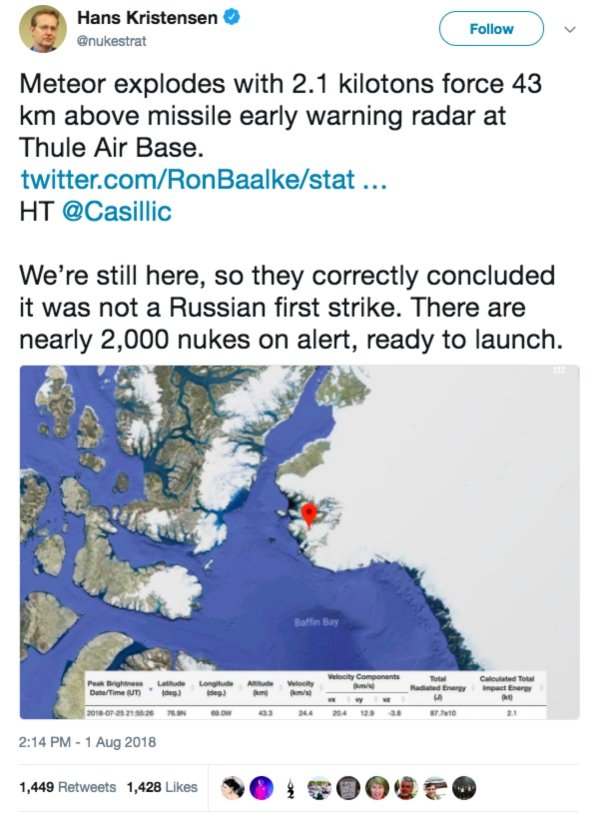
"Had it entered at a more perpendicular angle, it would have struck the earth with significantly greater force," Kristensen wrote on Business Insider.
The tweet which Kristensen retweeted described the meteor as a "fireball".
"A fireball was detected over Greenland on July 25, 2018 by US Government sensors at an altitude of 43.3 km. The energy from the explosion is estimated to be 2.1 kilotons," wrote Twitter user Rocket Ron.
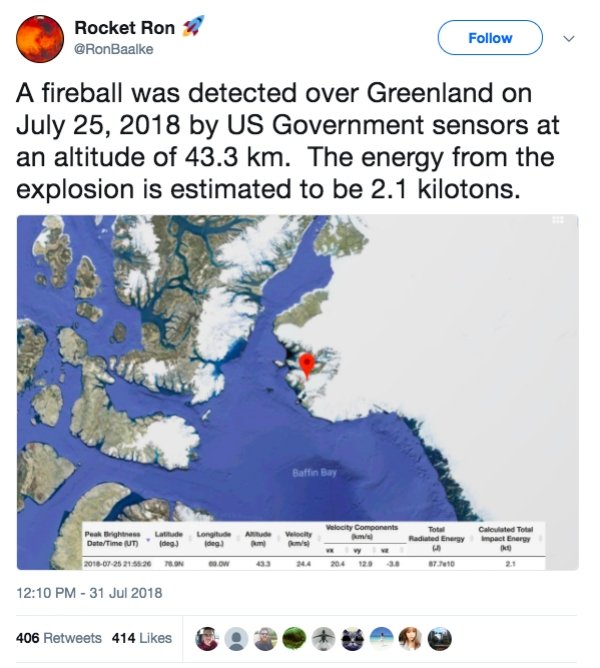
https://www.datastro.eu/explore/dataset/nasa-fireball-and-bolide-reports/And while the Air Force did not report the incident, some Twitter users pointed out that it had registered on an Open Data portal, with Lise Guerriero writing, "Indeed! Information about the fireball [is] also available on this #OpenData portal about #astronomy: @NASAJPL / @Caltech data."
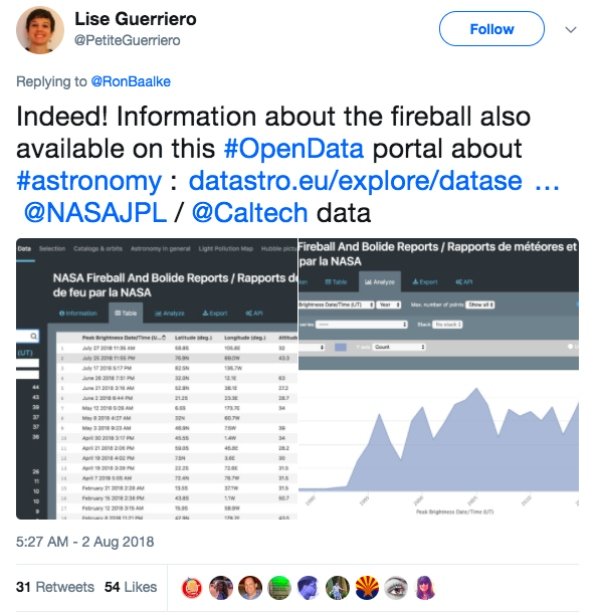
To put how dangerous this meteor had the potential to be into context, many news sources are now citing the Chelyabinsk meteor as an example of why the government should have issued a warning - even if it was just precaution - to those in the area.
Without warning, this 65-foot-wide meteor exploded in the Russian sky on February 15, 2013.
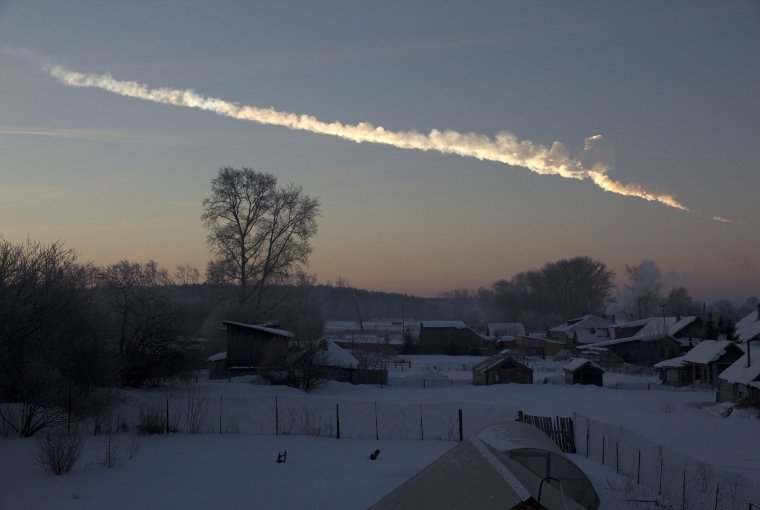
It was the size of a house, brighter than the sun and could be seen from as far away as 60 miles.
The meteor's breakup resulted in the injury of 1,500 people - the largest number ever harmed by an extraterrestrial object.

"The Chelyabinsk event drew widespread attention to what more needs to be done to detect even larger asteroids before they strike our planet," said NASA planetary defense officer Lindley Johnson. "This was a cosmic wake-up call."
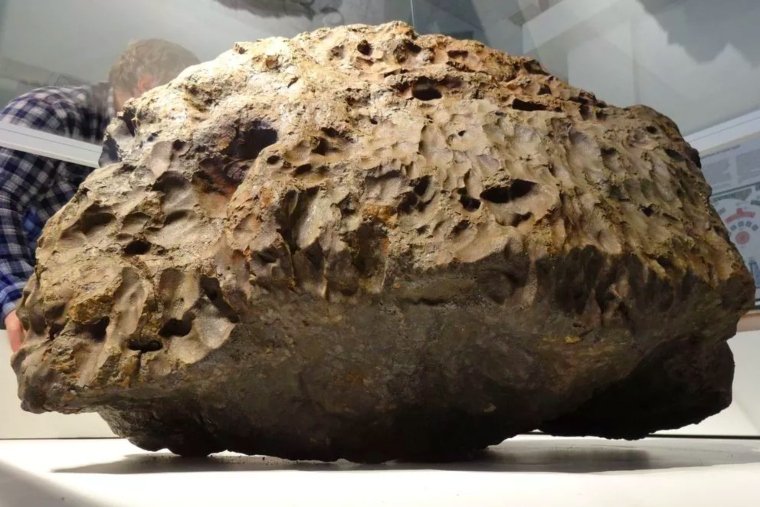
The International Asteroid Warning Network was established after this incident so that it would be easier for governments to detect extraterrestrial objects as they approach our atmosphere and act accordingly.
While the potential human cost of the meteor breaking up before impact could have been deadly, it did not have a patch on the destruction which its misinterpretation as an enemy missile could have had for humanity as a whole.
"Forgive me, am I understanding you're [sic] tweet correctly that had this meteor been incorrectly identified, it would have triggered the launch of 2,000 nukes?" wrote Twitter user @gaydogweed.

In response to this, @DabuXian revealed that objects being misidentified have almost lead to nuclear strikes in the past, writing, "Wouldn't be the first time. In 1995 the president of Russia literally was about to launch a full strike because they confused a scientific rocked with an attack. We're all alive today only because he hesitated."
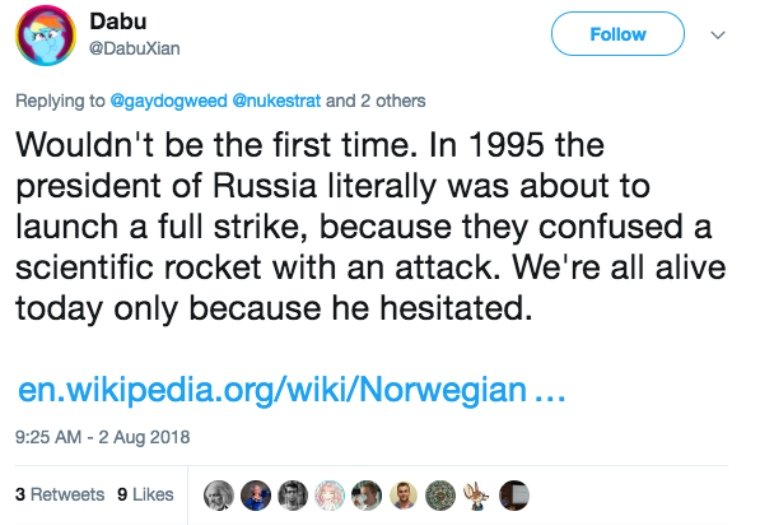
"One day soon we are all going to die from a miscalculation," ominously chimed @cherokeesher2.

"At this point, nuclear annihilation may be sweet relief," added @_etgeeee_

Others suggested that the meteor's close proximity to the air base was no coincidence and @Naill_Bob wrote, "Actually, the (cosmic) joke's on you: a 'hit' directly above a significant US military installation is clearly a message from a higher power."
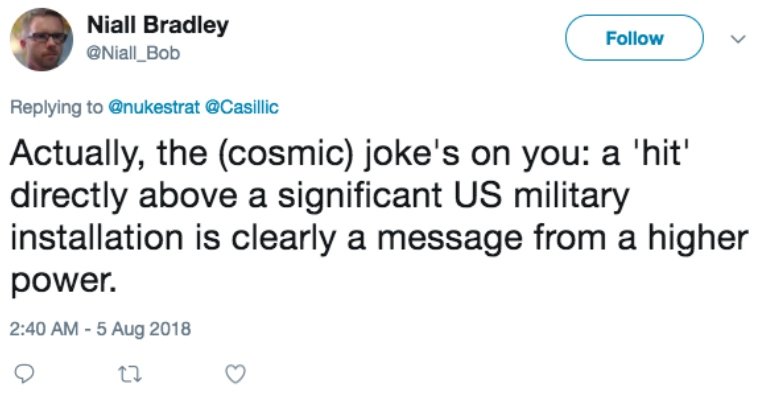
And, a man after my own heart, @DakotaRudesill simply remarked, "glad this didn't happen during the Cuban Missile Crisis or Able Archer 83!"
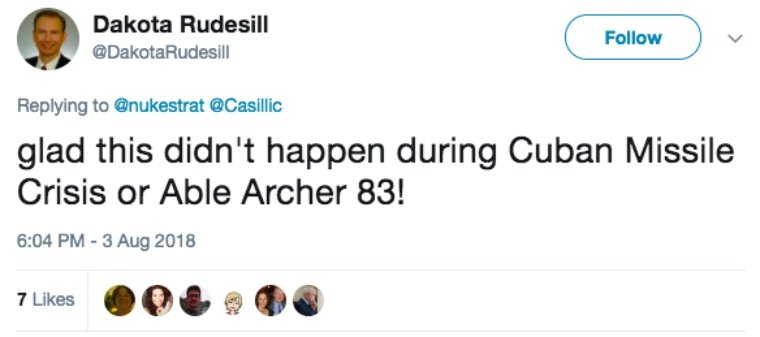
As much as we can all breathe a collective sigh of relief that the meteor was correctly identified, it still begs the question - why did the air force not report it? One explanation could be a study referenced by Kristensen, which found that a meteor struck Earth every 13 days over a 20-year-period, but the majority were "harmless" - breaking up when they entered our atmosphere.
Source
Hi @tehm, I'm @checky ! While checking the mentions made in this post I noticed that @nasajpl, @cherokeesher2 and @dakotarudesill don't exist on Steem. Maybe you made some typos ?
If you found this comment useful, consider upvoting it to help keep this bot running. You can see a list of all available commands by replying with
!help.Congratulations @tehm! You received a personal award!
Click here to view your Board
Congratulations @tehm! You received a personal award!
You can view your badges on your Steem Board and compare to others on the Steem Ranking
Vote for @Steemitboard as a witness to get one more award and increased upvotes!